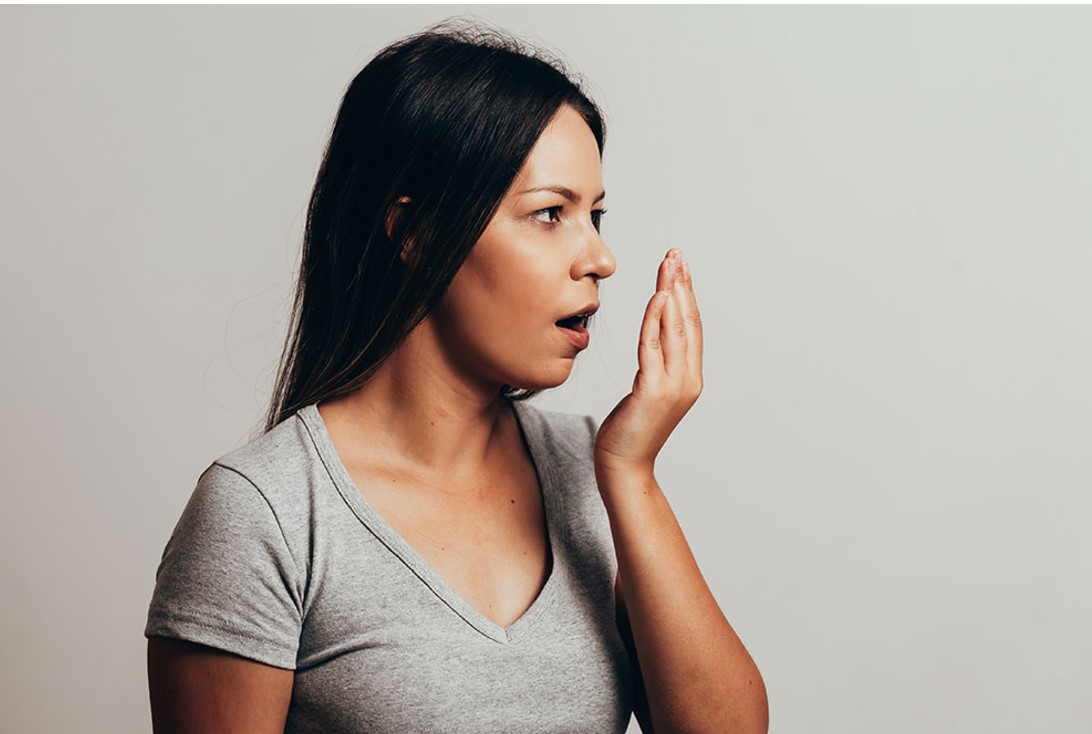Bad breath can be frustrating, especially if it lingers even after brushing. Certain habits that cause mouth odour even after brushing are often overlooked but can significantly impact oral health.
For example, skipping flossing allows food particles and bacteria to build up between teeth, leading to unpleasant odours.
Additionally, dehydration causes a dry mouth, reducing saliva production, which typically helps wash away odour-causing bacteria.
Consuming strong-smelling foods like garlic and onions can also lead to mouth odour, even after brushing, as these scents linger and are absorbed into the bloodstream…Click Here To Continue Reading>> …Click Here To Continue Reading>>
Smoking or using tobacco is another major contributor, coating the mouth with lingering smells that brushing alone can’t remove.
Regularly addressing these habits that cause mouth odour even after brushing can improve breath freshness and overall oral health.
Proper hydration, a full oral hygiene routine, and avoiding certain foods can make all the difference.
Poor Oral Hygiene:
1. Neglecting Tongue Cleaning: The tongue harbours bacteria, which can cause significant bad breath. Using a tongue scraper daily can effectively remove these bacteria and freshen your breath.
2. Skipping Flossing: Flossing removes food particles and plaque from between your teeth, areas that your toothbrush can’t reach. These trapped particles can lead to bacterial growth and bad breath.
3. Relying Solely on Mouthwash: While mouthwash can temporarily mask bad breath, it doesn’t address the underlying issue. Brushing your teeth twice a day with fluoride toothpaste is essential for removing plaque and bacteria.
4. Dehydration: Saliva helps wash away food particles and bacteria, keeping your mouth fresh. Drinking plenty of water throughout the day can help maintain adequate saliva production. READ FULL STORY HERE>>>CLICK HERE TO CONTINUE READING>>>
Underlying Health Conditions:
5. Dry Mouth: Dry mouth, or xerostomia, can lead to bad breath as saliva helps to wash away bacteria. Certain medications, medical conditions, and habits like mouth breathing can contribute to dry mouth.
6. Gum Disease: Gum disease, characterized by inflammation and infection of the gums, can cause persistent bad breath. Regular dental check-ups and proper oral hygiene are crucial for preventing gum disease.
7. Sinus Infections: Sinus infections can lead to postnasal drip, which can cause bad breath. Treatment of underlying sinus infections is essential for improving breath odour.
8. Gastrointestinal Issues: Certain digestive disorders, such as acid reflux and irritable bowel syndrome, can cause bad breath. Treating these underlying conditions can help alleviate bad breath.
Lifestyle Factors:
9. Diet: Consuming strong-smelling foods like garlic, onions, and spicy foods can contribute to temporary bad breath. Additionally, a diet high in sugar can feed bacteria, leading to increased bad breath.
10. Smoking and Tobacco Use: Smoking and tobacco use can significantly worsen bad breath. These habits can irritate the mouth and throat, leading to dry mouth and increased bacterial growth.
11. Certain Medications: Some medications can cause dry mouth as a side effect, contributing to bad breath. Consult with your doctor to discuss potential alternatives or strategies to manage dry mouth.
12. Stress and Anxiety: Stress and anxiety can lead to increased saliva production, which can sometimes cause bad breath. Practising relaxation techniques and stress management strategies can help alleviate this issue.
To maintain fresh breath, it’s essential to practice good oral hygiene, stay hydrated, and address any underlying health conditions. Regular dental check-ups are also crucial for identifying and treating potential causes of bad breath.
Here are some additional tips for maintaining fresh breath:
- Avoid excessive alcohol consumption: Alcohol can dehydrate the mouth and contribute to bad breath.
- Limit sugary drinks: Sugary drinks can feed bacteria, leading to increased bad breath.
- Chew sugar-free gum: Chewing sugar-free gum can stimulate saliva production and help to wash away food particles and bacteria.
- Use a mouthwash with antibacterial properties: A mouthwash with antibacterial properties can help kill bacteria and freshen your breath.
- Consider using a dental rinse: A dental rinse can help remove plaque and bacteria from hard-to-reach areas of the mouth.
If you are concerned about bad breath, it is important to see your dentist or doctor to rule out any underlying medical conditions.


 SPORTS10 months ago
SPORTS10 months ago
 SPORTS11 months ago
SPORTS11 months ago
 METRO11 months ago
METRO11 months ago
 METRO6 months ago
METRO6 months ago
 METRO10 months ago
METRO10 months ago
 HEALTH & LIFESTYLE11 months ago
HEALTH & LIFESTYLE11 months ago
 METRO11 months ago
METRO11 months ago
 HEALTH & LIFESTYLE6 months ago
HEALTH & LIFESTYLE6 months ago


